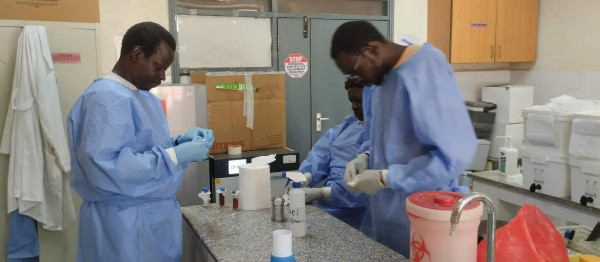In an effort to protect communities from diseases resulting from environmental and health setting contamination, the Ministry of Health, supported by the World Health Organization (WHO) and other partners, has embarked on an ambitious mission. Supported by funding from the United States Agency for International Development (USAID), EU Humanitarian Aid (ECHO), and Resolve to Save Lives, the initiative aims to upscale infection prevention and control (IPC) and water, sanitation, and hygiene (WASH) measures in healthcare facilities to minimize the risk of infection transmission and water-borne related outbreaks.
Since 2020, South Sudan has been grappling with heavy rainfall and rising water levels along the White Nile, which have led to massive flooding in many parts of the country. This has had a profound impact on the healthcare system, affecting nearly one million people and subsequently resulting in widespread disruption to normal patterns of life in the affected locations.
In response, WHO has intensified its support to the Ministry of Health, focusing on implementing effective IPC/WASH measures. This comprehensive strategy encompasses water quality testing, hand hygiene promotion, healthcare waste management, and the implementation of IPC guidelines through multimodal strategy improvement and standard operating procedures. Additionally, attention is given to addressing healthcare-associated infections and antimicrobial resistance, recognizing their significance in the current context.
Despite the challenging circumstances, WHO has successfully trained over 648 healthcare workers from 2023 to March 2024, showcasing the resilience and dedication of the healthcare system. These workers have been instrumental in bolstering the healthcare system’s resilience and deploying laboratory experts and public health officers nationwide to strengthen water quality surveillance and sanitary inspection efforts, including conducting onsite water quality tests.
As part of the intervention, a total of 967 water samples were collected and tested for physical, bacteriological, and essential chemical parameters, the test was conducted onsite and at the National Public Health Laboratory in Juba. Findings revealed that 581 samples tested positive with fecal Coliforms (E. coli), representing 60% of the contamination rate of water points across the country. In response, WHO has taken swift action, procuring and distributing over 1521 assorted IPC/WASH supplies, including color-coded waste bins, disinfectants, and water quality testing equipment, to several hotspot locations and counties.
Reflecting on the challenges ahead, Dr Humphrey Karamagi, the WHO Representative for South Sudan, said, “In our efforts to reduce infection and needless death due to infections, we place infection prevention at the Centre stage of all our health interventions.”
Dr Karamagi underscored WHO’s commitment to strengthening IPC programs, including water quality surveillance, and supporting the development and implementation of national IPC guidelines across all levels of healthcare facilities.
As part of strengthening the IPC Programme, WHO is implementing measures to ensure continuous technical support to the Ministry of Health by building the capacity of healthcare workers through refresher training, job mentorship, and giving strategic direction for attaining the minimum requirements for IPC Programs. WHO is also working closely with WASH and Health Cluster Partners to improve WASH in health facilities and promote the implementation of Multi Modal Improvement Strategies and integrate IPC into existing health structures. This will go a long way in improving patient outcomes and ensuring healthcare Worker protection. IPC must be institutionalized and taken as an everyday quality process in healthcare and not only as an outbreak response measure.
Distributed by APO Group on behalf of World Health Organization (WHO) – South Sudan.

